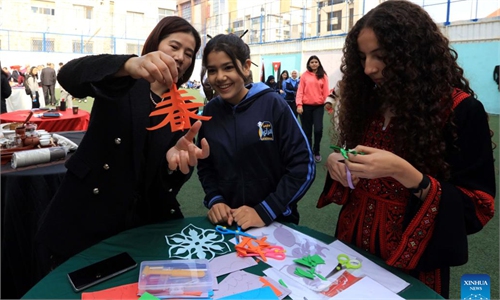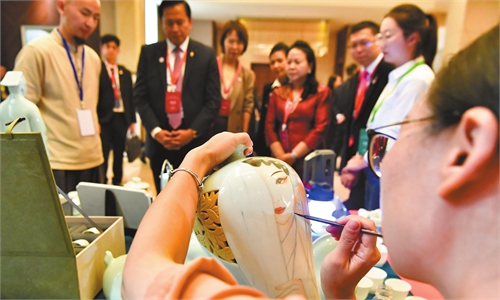ARTS / CULTURE & LEISURE
Chinese learning empowers mutual trust

Illustration: Liu Xiangya/GT
At the just-concluded 2024 World Chinese Language Conference, participants said that Chinese language learning plays a very important role in promoting mutual learning among civilizations and enhancing mutual political trust. Meanwhile, language teaching needs to adjust approaches to meet the demands of a new generation of students.
The year 2024 marks the 20th anniversary of the Confucius Institute worldwide. Celebrating the milestone, the Thematic Seminar on the 20th Anniversary of the Confucius Institute was held in Beijing on Saturday. The Brilliance of CI and plaques of appreciation were awarded to 41 foreign dignitaries, sinologists, school principals, and directors of Confucius Institutes from 34 countries to honor their outstanding contributions to the construction and development of Confucius Institutes.
Foreign guests told the Global Times that language is the best key to understanding a country. As China's comprehensive national strength and international status continue to improve, China's exchanges with the world are becoming increasingly close, and Chinese is spreading around the world, gradually becoming a "golden key" for people to communication beyond cultures and nationalities.
Jose Vicente Andreu Beso, director of the Confucius Institute and professor at the Faculty of Philology, Translation and Communication, University of Valencia, is one of the awarded delegates. He told the Global Times that promoting the Chinese language is very important for international understanding of China, Spain and other countries. It is a very positive two-way street for understanding the world.
Rafael de Miguel Gonzalez, director of the Confucius Institute at the University of Zaragoza, told the Global Times, "My students were first attracted by China's rich culture and then they start to learn the Chinese language. They are like family in a class and often help each other. In this harmonious group, they are motivated to learn more and more Chinese. We are very proud of their success."
At the conference, sporting the theme of "Interconnection, Integration, Inheritance, Innovation," delegates found themselves closely connected to the Global Civilization Initiative (GCI) that advocates respect for the diversity of civilizations, the common values of humanity, the importance of inheritance and innovation of civilizations, as well as robust international people-to-people exchanges and cooperation.
Ruth Njeri, a researcher from Tianjin Normal University's China-Africa Languages and Cultural Exchange Center, told the Global Times that young entrepreneurs can innovate together and come up with new ideas on how to better teach, learn and use the language.
"Chinese has grown beyond the Chinese people's mother tongue; it is also a world language. To answer the question how to leverage Chinese as a language to learn about the world and learn more about Chinese culture, from this perspective, young people may have more opportunities for cooperation in high-technology, media and film," she said.
Talking about the GCI, Gonzalez, who is also a scholar in geography, analyzed the similarity between the GCI and Global Understanding. "Both have a lot of connections, because we are living in a global world, we have global challenges, particularly, through geography, we also have geopolitical challenges, regarding the end of confrontation, the old confrontation between the East and the West. With the GCI, Belt and Road Initiative, it will help people to understand each other, to develop empathy for each other, and to make a more harmonious and peaceful world," he said.
"War and violence are not the way to solve problems. I think approaches like the GCI and Global Understanding must contribute to solving problems and making a more peaceful and prosperous world," said Gonzalez.
Ye Dan, Chinese director of the Confucius Institute at Sao Paulo State University, told the Global Times that many students have changed their destiny by learning Chinese.
Paloma Guieiro Nunes, a Brazilian student at the Confucius Institute at Sao Paulo State University, started learning Chinese in July 2020. She spent two to three hours learning Chinese each day.
Nunes passed the Hanyu Shuiping Kaoshi, or the Chinese Proficiency Test, for level 3 after five months. In 2021, she challenged herself by watching Chinese TV shows with Chinese subtitles.
Majoring in architecture, Nunes was inspired by Chinese architecture and her graduation thesis was about Chinese culture.
After pursuing a master's degree in Chinese international education at Hubei University, Verena Veludo Papacidero started to work at the school as a Portuguese teacher. Since 2016, she has been a local Chinese teacher at the Confucius Institute at São Paulo State University in Brazil, which was co-founded by Hubei University.
Many delegates to the conference shared the important role that Chinese plays in promoting mutual learning among civilizations.
Maribel Temoche Cortez, local director of the Confucius Institute at the Pontifical Catholic University of Peru, told the Global Times on Friday that learning Chinese has created new opportunities for many Peruvian students.
With her students speaking Chinese, Cortez believes that "they are going to understand more of the world, they are going to respect diversity, they are going to be more inclusive about the differences in the world. I think this is a very important mission at our Confucius Institute."
She also said that she thinks more citizens in Peru could have "this kind of skill to comprehend the world, to comprehend China."
The author is a reporter with the Global Times. life@globaltimes.com.cn



